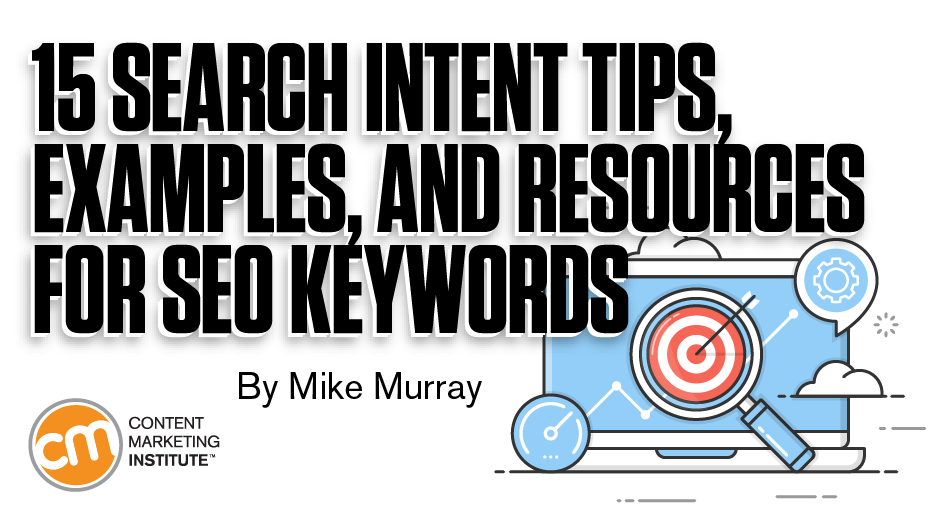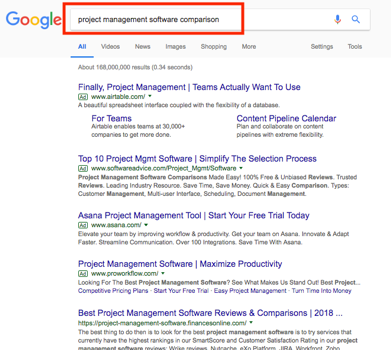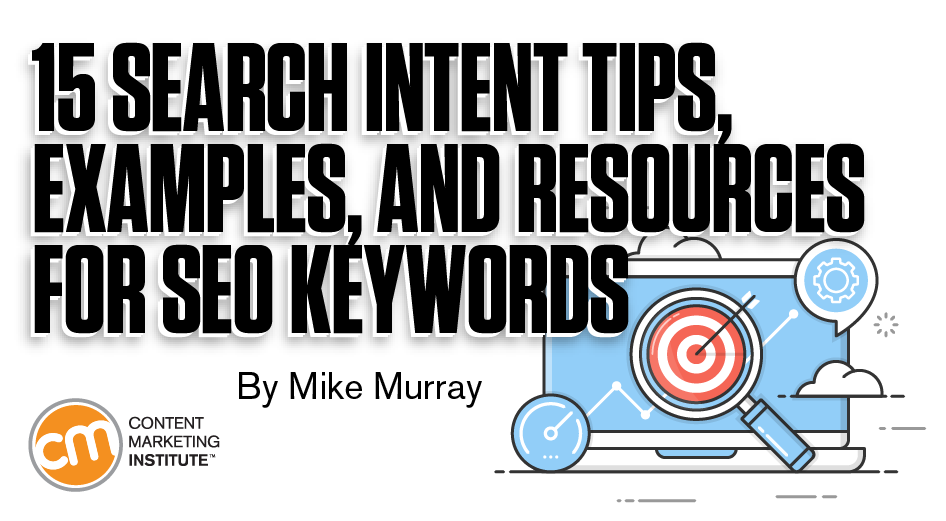Here is a closer look at types of user intent keywords and some other advice to keep in mind with your keyword choices: Transactional keywords Buy Order Purchase Schedule Compare Deal Discount Download Shipping Coupon Review Top Your brand, product, or service Category Free trial Offers Informational keywords I need to How What is What are Best ways to Alternatives Guide White paper Study Survey Navigational keywords Possible combinations could include your products and services and words like: Brand references Cost of Directions Reviews Testimonials Locations near me How intent matters Sometimes intent can cross over in different ways. Basecamp, which sells project management software, struggles with user intent except for navigational searches referencing its brand. The SEO page title? In other words, if you want to introduce a phrase, your overall website content must back it up. Check your rankings. Keep search volume in mind I’m a big believer in embracing keyword phrases hardly anyone uses. I check the search engine results pages on Google. Many people reference Google’s Keyword Planner to capture search volume and a competition rating of low, medium, or high. For example, what opportunities do they have to call or interact with the chat feature? The following provide additional guidance on search intent, including how to identify the best keyword phrase scenarios: How do you succeed when you select keywords based on search intent?

If you want to leverage search intent with SEO keywords on Google and other search engines, it’s best to balance the methods with the false hopes.
In a moment, I’ll dive into the big intent types like transactional, informational, and navigational.
Mostly, I want to share a perspective to help you suppress your excitement about choosing the perfect keyword scenarios for SEO.
Maybe you’re like me and think of searcher intent with the end goal in mind – getting that conversion. Don’t we want to minimize traffic that underperforms?
Here is a closer look at types of user intent keywords and some other advice to keep in mind with your keyword choices:
Transactional keywords
- Buy
- Order
- Purchase
- Schedule
- Compare
- Deal
- Discount
- Download
- Shipping
- Coupon
- Review
- Top
- Your brand, product, or service
- Category
- Free trial
- Offers
Informational keywords
- I need to
- How
- What is
- What are
- Best ways to
- Alternatives
- Guide
- White paper
- Study
- Survey
Navigational keywords
Possible combinations could include your products and services and words like:
- Brand references
- Cost of
- Directions
- Reviews
- Testimonials
- Locations near me
How intent matters
Sometimes intent can cross over in different ways. Check out what Moz founder Rand Fishkin writes about with commercial investigation search. Some companies master searcher intent and others barely find success, especially with transactional keywords.
Upwork, a freelancer hiring site, succeeds across the board. It often ranks well for all types of user intent keyword phrases:


Assurant, an insurance company focused on protecting things from major appliances to mobile devices, falls short with many searcher intent keywords. But it ranks well for some relevant phrases:

Perhaps the lower search positioning occurs because searchers who click find the landing pages basic and not too compelling.

Basecamp, which sells project management software, struggles with user intent except for navigational searches referencing its brand.

For Basecamp, search engine visibility is rare for non-branded phrases:


As you dig in with your user intent plan to lead to results more like Upwork and less like Basecamp, you’ll want to keep several variables in mind.
1. Set priorities
Like everything else that’s imperfect in marketing, you can only do so much at any time. Pick a section of your website, including select products and services. The more you take on, the more likely you’re going to mess up (i.e., hurt good rankings).
2. Decide whether to focus on existing or new content pages
Focusing on searcher intent for existing content is a little more troublesome. If you come up with some new keyword scenarios that you’re sure will boost leads and sales, you’ll run into some hurdles (they can be conquered). Question how the phrase will fit into the existing text. What needs to change? The content header? The SEO page…

COMMENTS